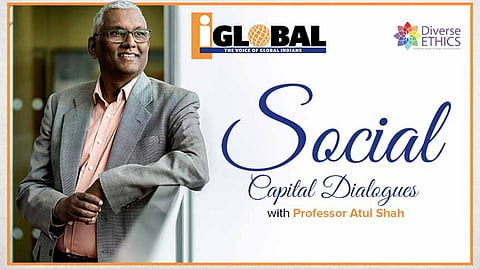

Explaining one culture to another involves many challenges and limitations. For immigrants to Britain, it is better to adapt than to explain, and those who are very good at adapting, are also good at assimilating and likely to succeed in their professions and careers. However, it is still important for us to retain our culture and respect its wisdom – otherwise there is a danger of dilution. Also, it helps if our colleagues at work understood what lies under our skins and is invisible.
For many years, I have been dealing with this dilemma through my work as both an academic and a community activist, someone who values the importance of protecting our heritage and communities. One solution I developed was to invite leaders to guided cultural experiences, where they immerse themselves in a different context, experience a culture ‘on its own terms’, and then have the opportunity to ask any questions and engage in a public dialogue. I have taken leaders to Mandirs, Gurdwaras, Churches, Mosques and Derasars, which are spaces of faith, but also community centres and cultural hubs, where social cohesion is nurtured and replenished on a regular basis.
Last Saturday, I took eminent leaders and artists to the Oshwal Centre in London to experience the Jain Ayambil Festival (a nine-day fasting festival to purify the soul), on the eve of Mahavir Jayanti. Among them were John and Michelle Christensen, founder of the Tax Justice Network; Brian Eno, world famous musician, activist and artist; Marcus and Bell Lyon, Human Geographers; Tracey Sage, a diversity consultant; Andrew Dyckhoff, an eminent leadership guru; Nick Barnard, curator of the Indian collection at the Victoria & Albert (V&A) Museum; and young Jain artists Bhavik Haria and Vivek Haria who are keen to spread music to wider audiences. They were welcomed to the Oshwal Centre by leaders Rumit Shah, Minesh Shah, Rajvee Punatar, Shandip Shah, and the Minister of Religion, Jayeshbhai Shah.
Festivals require a large amount of volunteering effort, and given that we are an increasingly time poor society, this is tricky to deliver in the best of times. It also requires very good motivation and a level of professional management to ensure that everyone has a positive and uplifting experience. Readers will recognise these challenges in their own communities. Visitors can directly experience the spirit and hospitality, and see that not only is there beautiful architecture in the form of a temple or the sculptures, but there is an equally creative and motivated living community which celebrates and lives by the ideals of Dharma.
MORE LIKE THIS…
The educational imprint of this is significant. It achieves more than any lecture or slide show, and affects visitors at multiple levels – mind, body and spirit. It helps our communities build new relationships, and cultivate ambassadors who are willing to speak positively about Dharma on our behalf, at times when we are not even in the meeting. This is critical to our survival and acceptance in wider society. Such visits are very hard to organise and coordinate, and require the cooperation of a number of leaders and volunteers. They cannot be corporatised.
We received a lot of very positive feedback, both from the VIPs and the community. There is an understanding that we want to engage, to befriend and connect to wider society, but also we want to be accepted for who we are and what we believe in. Nick Barnard of the Victoria and Albert Museum wrote: ‘I am always fascinated by the depth of thought and care that goes into all Jain religious activities and I appreciate the tremendously warm welcome we are offered by community members and the kindness of the volunteers.’
He then went to embarrass me by encouraging my communication and engagement skills: ‘Professor Atul, your own contribution over the years is particularly special as you have a remarkable ability to communicate the complex and sophisticated ideas of Jainism in such a clear and engaging way. You generously devote so much of your time, energy and abilities to helping people outside the community to engage with and begin to understand the tradition and philosophy, creating the sort of dialogues that are ever more essential in today’s increasingly fractured world.’
MORE LIKE THIS…
As a cultural leader at the V&A, Nick Barnard values the importance of community cohesion and the need to emphasise that artistic objects come from a living community, and such diaspora face challenges to protect their traditions, but often do so with significant enterprise and resilience. It is important that we all open our doors to visitors, and engage with them to build a peaceful world.
Professor Atul K. Shah [@atulkshah] teaches and writes about Indian wisdom on business, culture and community at various UK universities and is a renowned international author, speaker and broadcaster.